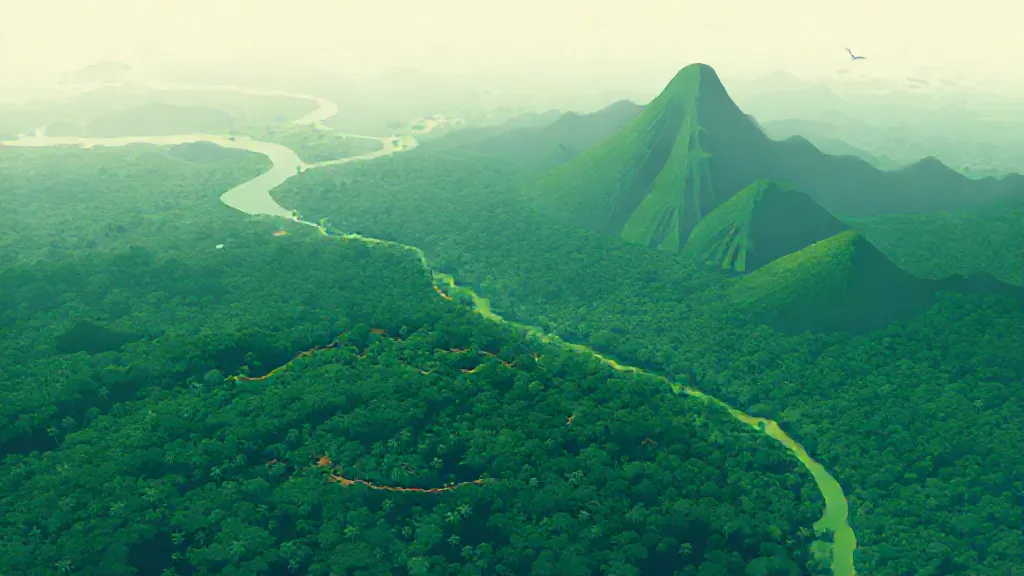The Amazon rainforest, often referred to as the "lungs of the Earth," plays a critical role in regulating the global climate and supporting biodiversity. Spanning across several countries in South America, including Brazil, Peru, and Colombia, the Amazon covers approximately 5.5 million square kilometers.
Its vast expanse is home to an estimated 390 billion individual trees, representing over 16,000 species. The importance of the Amazon extends beyond its borders, making its protection a global responsibility that affects everyone on the planet.
The Amazon's Role in Carbon Sequestration
One of the most significant contributions of the Amazon rainforest to the global environment is its ability to sequester carbon dioxide.
Trees absorb CO2 during photosynthesis, and the Amazon is estimated to store around 140 billion metric tons of carbon. This process is crucial in mitigating climate change, as it helps to offset greenhouse gas emissions. However, deforestation and degradation of the forest, driven by agriculture, logging, and mining, release this stored carbon back into the atmosphere, exacerbating global warming.
Protecting the Amazon is essential for maintaining its role as a carbon sink.
Biodiversity Hotspot and Its Global Implications
The Amazon is one of the most biodiverse regions on the planet, hosting approximately 10% of known species. This includes countless plants, animals, and microorganisms, many of which are not found anywhere else.
The loss of biodiversity can have dire consequences, not only for local ecosystems but also for global food security and medicine. Many pharmaceuticals are derived from plants found in the Amazon. Thus, the destruction of this vital habitat can limit future discoveries that could benefit humanity.
Global cooperation is necessary to preserve this biodiversity and ensure sustainable use of its resources.
Indigenous Peoples and Their Role in Conservation
Indigenous communities have lived in harmony with the Amazon for thousands of years, possessing traditional knowledge that is invaluable for conservation efforts. These groups often act as stewards of the land, maintaining ecological balance and protecting biodiversity.
However, their rights and territories are frequently threatened by external interests, such as agribusiness and mining. Supporting Indigenous rights and integrating their knowledge into conservation strategies is crucial for the sustainable management of the Amazon. This responsibility extends beyond South America, as global consumers play a role in influencing practices that affect these communities.
Economic Interests vs. Environmental Protection
The Amazon is often seen as a resource-rich region ripe for exploitation, which raises complex issues regarding economic development versus environmental protection. Governments and corporations may prioritize short-term economic gains over long-term sustainability.
This creates a dilemma where local communities may face pressure to engage in destructive practices for economic survival. Global responsibility entails advocating for policies that promote sustainable development, ensuring that the needs of local populations are met without compromising the health of the Amazon.
Climate Change and Its Global Effects
The impacts of climate change are felt worldwide, and the Amazon rainforest is no exception.
Changes in rainfall patterns, increased temperatures, and extreme weather events threaten the delicate balance of this ecosystem. As the Amazon experiences these changes, it can lead to a feedback loop that further exacerbates climate issues globally. Protecting the Amazon is not just about preserving a rainforest; it is about safeguarding the planet's future.
The interconnectedness of climate systems means that actions taken in the Amazon can have far-reaching effects.
International Cooperation and Policy Frameworks
Addressing the challenges facing the Amazon requires international cooperation and robust policy frameworks. Agreements such as the Paris Agreement emphasize the importance of preserving forests in the fight against climate change.
Countries must work together to enforce environmental regulations, provide funding for conservation initiatives, and support sustainable development practices. Global responsibility means recognizing that the health of the Amazon is tied to the health of the planet and requires a collective effort to protect it.
The Role of Consumers in Conservation
Consumers have a significant role to play in protecting the Amazon.
By making informed choices about the products they purchase, individuals can support sustainable practices and companies that prioritize environmental stewardship. This includes reducing demand for products linked to deforestation, such as beef and palm oil, and choosing sustainably sourced goods. Additionally, raising awareness about the importance of the Amazon and advocating for its protection can influence policymakers and corporate practices.
Global responsibility starts with individual actions that contribute to a larger movement for change.
Conclusion: A Shared Responsibility
In conclusion, protecting the Amazon rainforest is a shared global responsibility that transcends national borders. The ecological, cultural, and economic significance of this region necessitates a unified approach to conservation.
By understanding the interconnectedness of our actions and their impacts on the Amazon, we can work together to ensure its preservation for future generations. The health of the Amazon is intrinsically linked to the health of our planet, making it imperative that we all take part in its protection.
